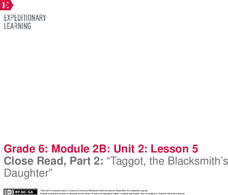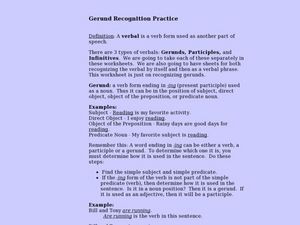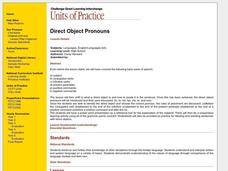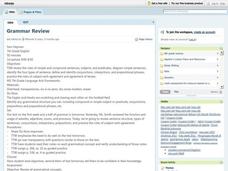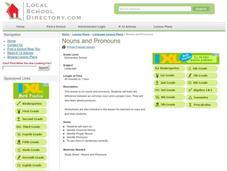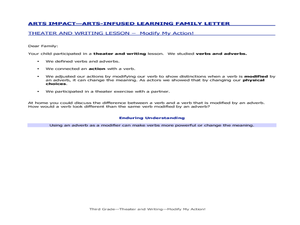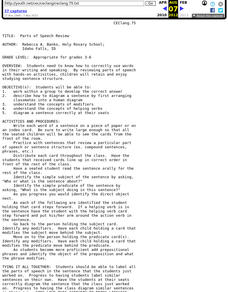Curated OER
ASL: Lesson 15
ASL is fun to learn and now so easy! This is lesson 15 in a series of 30+ lessons of learning or teaching ASL in a comprehensible and strategic way. Use this lesson to reinforce identifying community helpers and conducting an interview....
One Stop English
A Lesson on Register
The classroom might not be the best place for informal language, but it's a great place to teach middle and high schoolers how to identify the correct language register for their audience. A short lesson on formal and informal language...
EngageNY
Close Read, Part 2: “Taggot, the Blacksmith’s Daughter”
It is just a figure of speech. Readers look for figurative language as they read Taggot, the Blacksmith’s Daughter. They complete a Figurative Language graphic organizer by recording and identifying the types of figurative...
Curated OER
Alphabet Fun
Student teams use alphabet cereal to make up a word that fits a specific part of speech announced by the teacher.
Curated OER
Grammar Court
Students go on the lookout for grammatical errors. In this grammar lesson, students identify grammatical errors that they find in print. Students share their findings with their classmates by posting them in the "grammar jail" in their...
Curated OER
Gerund Recognition Practice
In this gerund practice worksheet, students discover what gerunds are as they read an informative lesson. Students then respond to 10 questions that require them to identify gerunds and identify the types of nouns they act as in the...
Curated OER
Adjectives, Adverbs and Advertising
Young scholars identify adjectives and adverbs and be able to use them correctly in a Christmas-related creative writing project. They work in pairs to cut out ads from a magazine to classify them as adjectives and adverbs.
Curated OER
ABC Grammar Book
Elementary learners create an ABC grammar book. The project begins with class members taking digital pictures of items that begin with each letter of the alphabet. Depending on level, they then add a word or a complete sentence to...
Curated OER
Challenging Stereotypes: A New Look at Old Age
Combine a lesson on the elderly with grammar instruction. Before viewing a series of provided video clips, class members brainstorm a list of words related to senior citizens and organize these words into categories that correspond with...
Curated OER
Identifying the Principle Parts of Irregular Verbs
In this irregular verbs worksheet, students write the correct form of irregular verbs. Students identify the principle parts of given verbs. Students answer forty fill in the blank questions.
Curated OER
The One and More Than One Game
Students explore language arts by participating in a noun game. In this part of speech lesson, students collaborate in small groups and play a card game based on singular and plural nouns. Students cut out the cards from a worksheet...
Curated OER
Direct Object Pronouns
High schoolers work together to identify parts of a sentence, and decide where the direct object pronoun should go and what it should replace.
Digital Forsyth
Old Salem Speech
The focus of the lesson is rhythmic speech and 4/4 time. The topic of the lesson is trades common in Old Salem during the colonial period. Learners will practice keeping time with their voices and body percussion. They will then research...
Curated OER
Grammar Review
Review grammar rules for simple and compound sentences. Learners diagram sentences and identify conjunctions, interjections, and prepositional phrases. As a class, they study their notes and complete pages in their grammar book to...
Curated OER
Pronoun-Antecedent Agreement Made Easy
Middle and high schoolers check their writing for pronoun-antecedent agreement. After identifying the pronouns in their writing, they then complete a table with the pronouns and corresponding antecedents, making revisions as necessary.
Curated OER
Nouns and Pronouns
Young readers explore nouns and pronouns. They define what a noun is and highlight the nouns in given sentences. Learners are then introduced to pronouns, and identify them in simple sentences.
Curated OER
Modify My Action
Third graders listen to directions as they perform a theatrical role. In this vocabulary lesson, 3rd graders listen to and observe the adjectives given to them during a practice of their performance by the director. Students...
Curated OER
Nouns
Young readers practice classifying nouns for people, places and things. They are read a story by their teacher and identify any nouns they remember. They create a chart on the board and place them in their proper category.
Curated OER
Describe Yourself!
Who are you? Where are you from? Teach young Spanish language learners how to identify themselves and where they're from. They draw a picture of themselves to help develop vocabulary for this activity.
Curated OER
The City Life or the country Life: conventions: Comparative and Superlative Forms of Adjectives and Adverbs
Reinforce knowledge of adjectives and adverbs by game playing. To better understand English conventions young writers, use flashcards to identify the base word and its comparative or superlative form.
Curated OER
Parts of Speech Review
Young scholars need to know how to correctly use words in their writing and speaking. By reviewing parts of speech with hands-on activities, students retain and enjoy studying sentence structure.
Albert Shanker Institute
Dream Under Development
As part of their study of the 1963 March on Washington, class members do a side-by-side comparison of the original text of Martin Luther King's "I Have a Dream Speech" with a transcript of the speech he delivered. The take away from the...
Curated OER
Ready, Set, Action
Learners investigate parts of speech by analyzing action words in sentences. In this verb usage lesson, students read sentences to each other and identify the action words and verbs used. Learners participate in a speed challenge in...
Curated OER
Into To Adverbs
Students explore the function of adverbs. While taking notes during the class lecture, students explore the parts of speech and label the adverbs. They identify the types of questions that adverbs answer and explore the difference...


